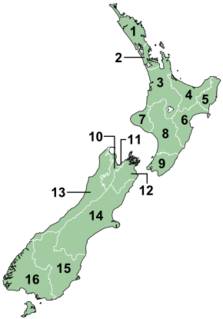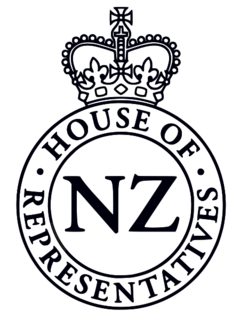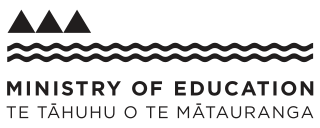
The politics of New Zealand function within a framework of a unitary parliamentary representative democracy. New Zealand is a constitutional monarchy in which a hereditary monarch—since 6 February 1952, Queen Elizabeth II—is the sovereign and head of state.
A unitary authority is a type of local authority that has a single tier and is responsible for all local government functions within its area or performs additional functions which elsewhere in the relevant country are usually performed by national government or a higher level of sub-national government.

New Zealand is divided into sixteen regions for local government purposes. Eleven are administered by regional councils, and five are administered by unitary authorities, which are territorial authorities that also perform the functions of regional councils. The Chatham Islands Council is similar to a unitary authority, authorised under its own legislation.
A city council, town council, town board, or board of aldermen is the legislative body that governs a city, town, municipality, or local government area.

Public sector organisations in New Zealand comprise the state sector organisations plus those of local government.

Electoral reform in New Zealand has, in recent years, become a political issue as major changes have been made to both Parliamentary and local government electoral systems.

The New Zealand House of Representatives is a component of the New Zealand Parliament, along with the Sovereign. The House passes all laws, provides ministers to form a Cabinet, and supervises the work of the Government. It is also responsible for adopting the state's budgets and approving the state's accounts.

The Ministry of Education is the public service department of New Zealand charged with overseeing the New Zealand education system.

An electorate is a geographical constituency used for electing members to the New Zealand Parliament. In informal discussion, electorates are often called seats. The most formal description, electoral district, is used in legislation. The size of electorates is determined on a population basis such that all electorates have approximately the same population.
District Health Boards (DHBs) in New Zealand are organisations established by the New Zealand Public Health and Disability Act 2000, responsible for ensuring the provision of health and disability services to populations within a defined geographical area. They have existed since 1 January 2001 when the Act came into force. There are 20 DHBs. Initially there were 21 DHBs, and this was reduced to the current 20 organisations in 2010. DHBs receive public funding from the Ministry of Health on behalf of the Crown, based on a formula which takes into account the total number, age, socio-economic status and ethnic mix of their population. DHBs are governed by boards, which are partially elected and partially appointed by the Minister of Health.
An election commission is a body charged with overseeing the implementation of electioneering process of any country. The formal names of election commissions vary from jurisdiction to jurisdiction, and may be styled an electoral commission, a central or state election commission, an election board, an electoral council or an electoral court. Election commissions can be independent, mixed, judicial or executive. They may also be responsible for electoral boundary delimitation. In federations there may be a separate body for each subnational government. The election commission has a duty to perform election related activities in an orderly manner. For election related problems, Election Commission is responsible.

The Government of New Zealand, or New Zealand Government, is the administrative complex through which authority is exercised in New Zealand. As in most parliamentary democracies, the term "Government" refers chiefly to the executive branch, and more specifically to the collective ministry directing the executive. Based on the principle of responsible government, it operates within the framework that "the Queen reigns, but the government rules, so long as it has the support of the House of Representatives".

The Auckland Council is the local government council for the Auckland Region in New Zealand. The governing body consists of a mayor and 20 councillors, elected from 13 wards. There are also 149 members of 21 local boards who make decisions on matters local to their communities. It is the largest council in Oceania, with a $3 billion annual budget, $29 billion of ratepayer equity, and 9,870 full-time staff as of 30 June 2016. The council began operating on 1 November 2010, combining the functions of the previous regional council and the region's seven city and district councils into one "super council" or "super city".

New Zealand has a unitary system of government in which sub-national entities are created by the authority of the central government. Local government in New Zealand has only the powers conferred upon it by Parliament. These powers are distinctly fewer than in many other countries. For instance, police and education are run by central government, while the provision of low-cost housing is optional for local councils.

The Financial Markets Authority (FMA) is the New Zealand government agency responsible for financial regulation. It is responsible for regulating all financial market participants, exchanges and the setting and enforcing of financial regulations.
Local government bodies in New Zealand have responsibilities under the Local Government Act 2002 (LGA) to perform a wide range of functions, and provide a wide range of services to the communities they represent. There is not an explicit focus on human rights in New Zealand local government, or any direct reference to human rights under the LGA. Local bodies in New Zealand are required to act in a way that is consistent with the rights guaranteed under the New Zealand Bill of Rights Act 1990 (NZBORA). Internationally there is growing consideration of how local government does and could promote and protect fundamental rights.

The 1989 local government reform was the most significant reform of local government in New Zealand in over a century. Some 850 local bodies were amalgamated into 86 local authorities, made up of regional and territorial levels.








